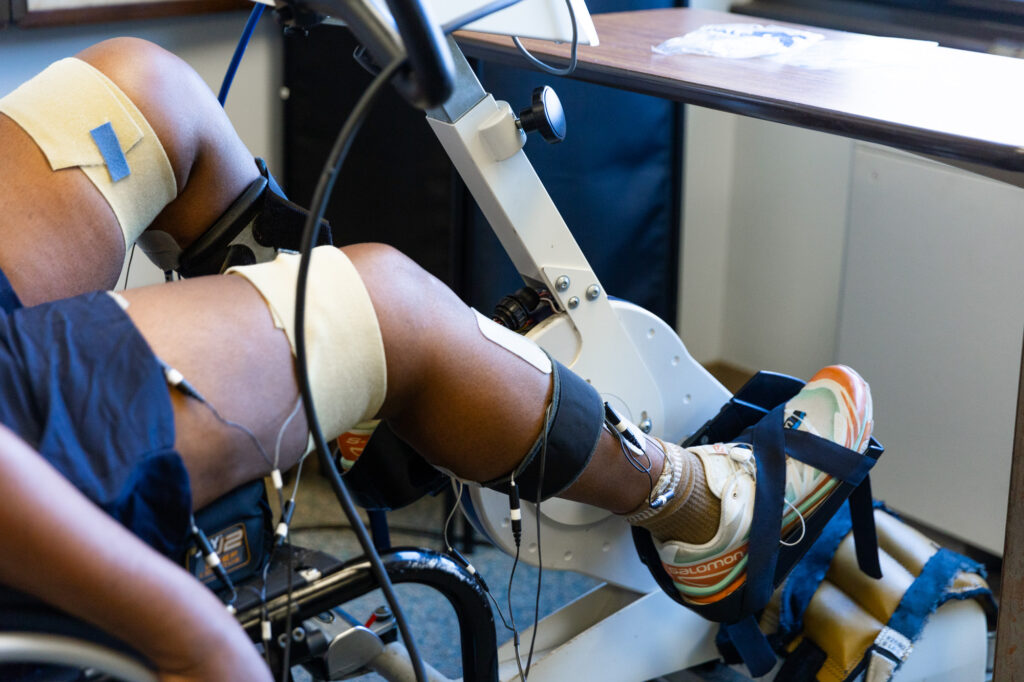
A spinal cord injury is a serious medical condition. It can have long-term effects physically, mentally and emotionally. The proper rehabilitation can make a significant difference in a patient’s overall health and wellness.
In the U.S., there are approximately 18,000 new cases of traumatic spinal cord injuries every year. They can occur from a variety of different traumatic events. The spine can be damaged during falls, car accidents or violence. A spinal cord injury can have a severe impact on a person’s mobility, strength and sensations, and the effects can impact their ability to carry out everyday functions. Rehabilitation for a spinal cord injury is a multifaceted process. It can help a patient gain independence and restore functions as much as possible.
We’ll talk about the different aspects of spinal cord injury rehabilitation. Then we’ll discuss how Ability KC will be by your side throughout the process.
What a patient can expect from spinal cord injury rehabilitation
Rehabilitation for a spinal cord injury can look different for every patient. The type of treatment that the healthcare provider will recommend can depend on the severity and location of the injury. Approximately half of all spinal cord injuries impact the cervical spine, which is located in the neck. It’s also possible for it to be sustained in the thoracic spine (middle back) or the lumbar spine (lower back).
The goals of spinal cord injury rehabilitation include:
- Improve physical functioning
- Alleviate pain and associated symptoms
- Reduce the risk of complications
- Address mental and emotional distress caused by injury
- Improve overall quality of life
Rehabilitation for a spinal cord injury will be tailored to each patient’s specific goals, abilities and challenges. It involves a combination of therapy modes, mental healthcare and assistance with transitioning to the next phase of their life.
Here’s what rehabilitation for a spinal cord injury typically entails:
- Physical therapy — One of the first courses of action for a spinal cord injury is physical therapy. A spinal cord injury has the biggest impact on a person’s motor functions. A physical therapist will guide the patient through functional tasks, such as safety with transfers, bed mobility, standing and gait training if appropriate, as well as balance and strengthening exercises. The goal is to improve their overall mobility and function at a safe pace.
- Occupational therapy — When we talk about transitioning a patient back into their daily routines, we’re referring to the specific tasks that each patient carries out every day. An occupational therapist can help a patient improve their motor skills as much as possible so that they can perform everyday actions. These tasks often include getting dressed and using eating utensils.
- Speech therapy — A spinal cord injury’s effects on a person’s speech can vary from patient to patient. Many experience a decreased voice function due to the lack of respiratory support. They may develop a language disorder, articulation challenges and reduced volume. A speech therapist can help improve a patient’s ability to communicate, possibly involving external tools.
- Recreational therapy — A patient can improve their mental, social and emotional health by enjoying recreational and leisure activities throughout their rehabilitation. A recreational therapist will guide a patient through activities that can boost their confidence. Recreation can also decrease anxiety and depression.
- Psychology — Any traumatic injury can result in negative emotions and thought patterns. These may interfere with a patient’s ability to move forward with their recovery process. A mental health provider, such as a psychotherapist, can help a patient work through their emotional and mental roadblocks. These challenges may be caused by the traumatic event that caused the injury and how the injury will impact their future.
- Social work — Returning to school or work following a spinal cord injury can come with many obstacles along the way. That’s why rehabilitation often entails collaborating with a social worker. They’ll help the patient gain the resources and education required to return to essential aspects of their day-to-day life with the right tools and accommodations.
Spinal cord injury rehabilitation at Ability KC
Even though a spinal cord injury is life changing, rehabilitation can help patients navigate those changes. It can help them gain as much mobility and function as possible. With the right treatments and healthcare providers, people who have experienced a traumatic spinal cord injury can work toward improving their overall quality of life.
At Ability KC, our spinal cord rehabilitation services are offered through our outpatient day program. We’ll help guide patients through every facet of their rehabilitation to improve their overall well-being, from outpatient therapy to neuropsychology.
Ability KC is a designated Comprehensive Outpatient Rehabilitation Facility (CORF) with a Commission on Accreditation of Rehabilitation Facilities (CARF) accreditation. Contact our team today for more information or to schedule an initial appointment.